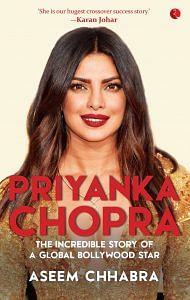Many Indians were waiting for Priyanka Chopra to fail in Quantico and they found her failure in her accent.
There was the question of Alex Parrish’s ethnicity. In the show, as it was now broadcast, Alex is the child of an Indian mother and an American father who has spent time living in Mumbai, in India. ‘When I got the part we had a whole debate we should change her name, make her more Indian, make her Anjali or something,’ Priyanka told NPR’s Eric Deggans a few months after the show was launched in September 2015.‘I didn’t want to change the character. I wanted to act like Alex.’
‘Alex’s Indianness was never the focal point of the show,’ Sharbari Ahmed says. After Sharbari joined the writing team, the show’s producers realized that she was also Muslim—something her name gives away immediately. The fact that Sharbari was Muslim became an added advantage. She could bring in subtle distinctions about the Muslim characters in the show.
‘They said she’s an FBI agent, she is an Indian American, but they didn’t call constant attention to her Indianness,’ Ahmed says. ‘They put her in there and they didn’t make a lot of hullabaloo about it. That was the wisest move when you don’t understand what you are dealing with culturally. I did try and talk to the producers that she is so popular in India, the rest of South Asia, the Middle East, North Africa, Eastern Europe. I said there are a lot of us out there and we love our Bollywood movie stars and so it might not have been so terrible to reference her Indianness and the culture.’
There were minor references for those looking for Alex’s Indianness. Right at the beginning of the show, in the pilot, as Alex is found in the rubbles of New York City’s Grand Central Station, we notice the symbol Om on her bracelet. And in Episode 3, camera briefly pans around Alex’s room and we can see a the small statue of dancing Shiva. But that was it.
‘My American side is happy that she wasn’t exoticized,’ Sharbari says. ‘But my desi, Bengali side feels like we had an opportunity here and I feel that we could have done more to push the diversity ball.’
It is important to note that while a network like ABC appeared to be progressive by constantly thinking of diversity, it was also shy to really push the envelope. It is cable TV and streaming services that actually bring shows that connect to the newer audiences. That happened with HBO’s The Night Of, and the Netflix’s Master of None (both shows won Emmys in 2017) and the Hasan Minhaj show Homecoming King. All those shows were streamed in 2016–17, the same time Quantico was running on ABC. While Quantico failed to bring in the ethnicity of its protagonist as a significant part of the plot line, those other shows along with the hit indie Hollywood film The Big Sick, from the summer of 2017, narrated honest stories about South Asians in America. The writers of these shows were not embarrassed about the South Asian experiences in America. The shows did not shy away from talking about those immigrant lives, in fact, they proudly displayed the differences of their protagonists. And they hit the right note not just with South Asians but also with the general audience as well.
As NPR’s Eric Deggans says, ‘If you create a show that is authentically about a culture, it will speak to people outside that culture too because they respond to the authenticity of it.’ He adds, giving the example of HBO’s hit show The Sopranos that authentically introduced the Italian-American culture of New Jersey. ‘I watched that show because I don’t know anybody like that. I really enjoyed learning about that culture.’
While Priyanka obviously looked South Asian, Quantico’s producers put her through extensive accent training. The American accent she tried to acquire was a matter of much debate, mocking and ridicule in India. It was almost like despite months of anticipation of seeing Priyanka Chopra—the first major Indian actor to appear on a network television show— many Indians were waiting for her to fail and they found her failure in her accent. People acquire accents for various reasons. In Priyanka’s case, one reason was because she had lived in the US as a teenager, then, she also had to sing her singles sounding like an American. Now this major role on a television show required her to speak like an American. But sadly, her Indian critics were unforgiving.
Priyanka clarified that the accent training was hard for her, especially rolling her ‘Rs’ as Americans tend to do. And when the criticism in India hit her hard, she made a joke of it. Speaking in her mostly normal Indian accented English with a bit of Americanism thrown in, she made fun of the situation on Late Night With Seth Meyers, ‘This is my fake accent, my Indian accent is a fake accent.’
There was at least one journalist in India who defended Priyanka’s decision to adopt an American accent while she acted in a television show in the US. This is what Buzzfeed India editor Rega Jha had to say in Priyanka’s defence, ‘The hate stems from a weird assumption that Chopra worked her ass off to make it to Hollywood, for India. For us. Now that she’s there, how dare she reassimilate into the culture that shaped her adolescence? How dare she adapt for her work, rather than shout her Indianness from the rooftops at every opportunity? That luxury we happily granted to Hugh Laurie when he learned an American accent for House MD and to Renée Zellweger when she dropped her Texan drawl to become the very British Bridget Jones. Just imagine if all of England had protested Christian Bale’s American accent in The Dark Knight, or if Australia disowned Heath Ledger for not making the Joker more Australian.’
There were times when Priyanka felt the need to explain to the Western media why Alex Parrish had to have an American accent. But she explained it in a tireless and outdated manner. ‘I didn’t want to be this stereotype of what Indian people are usually seen as in global pop culture, you know?’ Priyanka told Vanity Fair. ‘We don’t just have to be Apu from The Simpsons.’
It is good that Priyanka took a stand on not wanting to sound like Apu Nahasapeemapetilon, but it also seems like she had missed the bus. Anti-Apu sentiments have been very prevalent amongst Indian American and other South Asian actors for a while now. Most Indian American actors on American television do not have to talk like Apu. There is even a new documentary, The Problem With Apu (2017), with several Indian American actors and comedians including Aziz Ansari, Kal Penn, Hasan Minhaj, Russell Peters (well, he is a Canadian American), Hari Kondabolu and Asif Mandavi discussing this issue. The documentary has been covered widely by the mainstream American press. And its success led to the Greek-American actor Hank Azaria—the voice of Apu on The Simpsons—to admit for the first time that he was ‘perfectly willing and happy to step aside, or help transition it (the Apu character) into something new.’
 This is an excerpt from Aseem Chhabra’s ‘Priyanka Chopra: The Incredible Story of a Global Bollywood star’ . The book is published by Rupa Publications.
This is an excerpt from Aseem Chhabra’s ‘Priyanka Chopra: The Incredible Story of a Global Bollywood star’ . The book is published by Rupa Publications.



